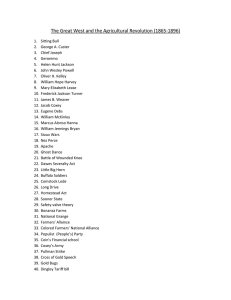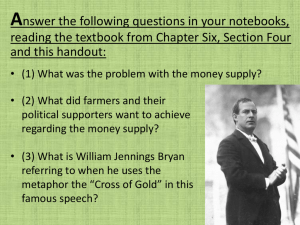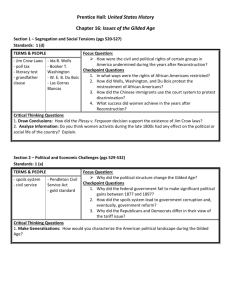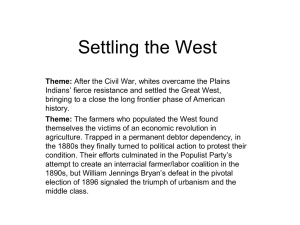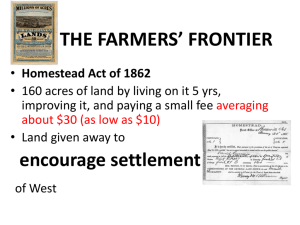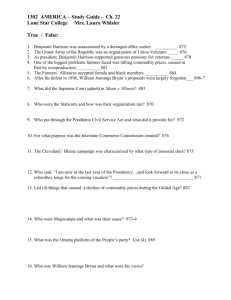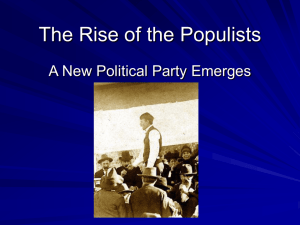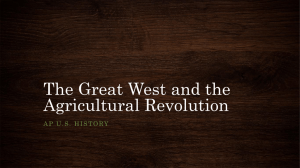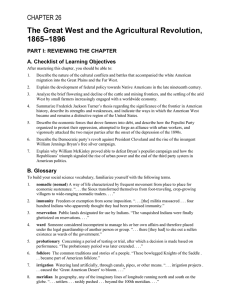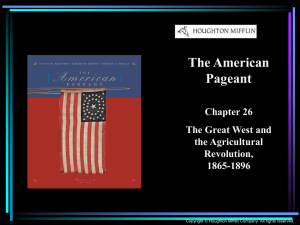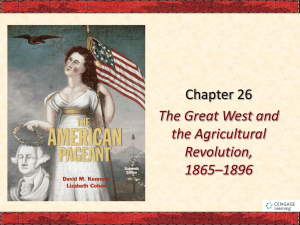File
advertisement
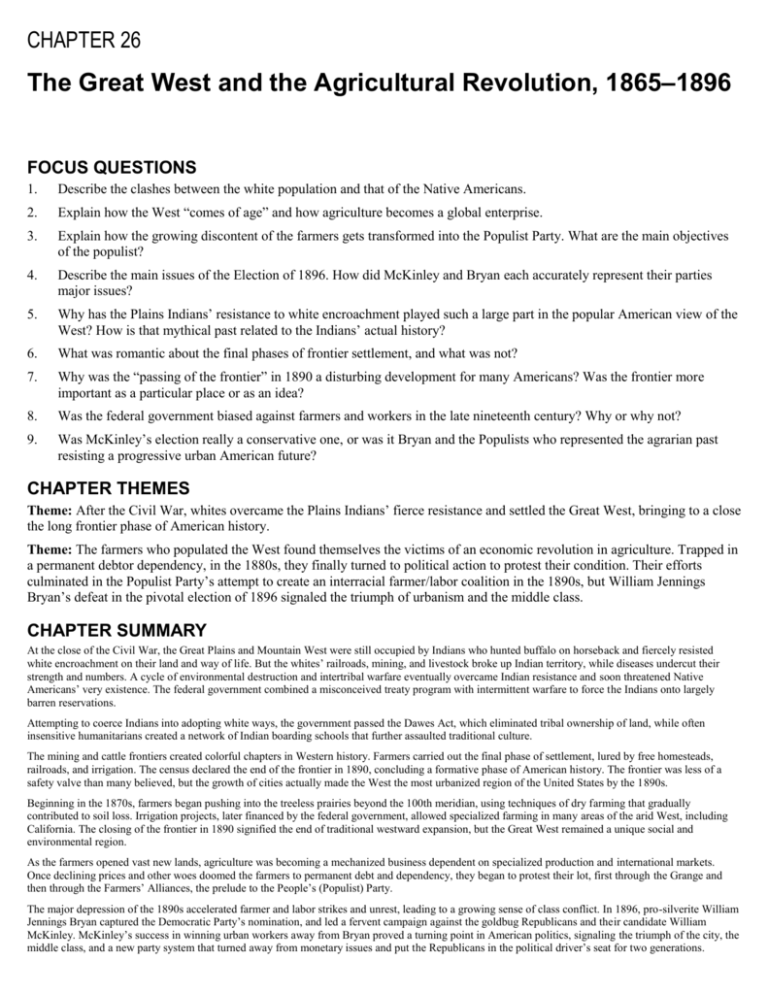
CHAPTER 26 The Great West and the Agricultural Revolution, 1865–1896 FOCUS QUESTIONS 1. Describe the clashes between the white population and that of the Native Americans. 2. Explain how the West “comes of age” and how agriculture becomes a global enterprise. 3. Explain how the growing discontent of the farmers gets transformed into the Populist Party. What are the main objectives of the populist? 4. Describe the main issues of the Election of 1896. How did McKinley and Bryan each accurately represent their parties major issues? 5. Why has the Plains Indians’ resistance to white encroachment played such a large part in the popular American view of the West? How is that mythical past related to the Indians’ actual history? 6. What was romantic about the final phases of frontier settlement, and what was not? 7. Why was the “passing of the frontier” in 1890 a disturbing development for many Americans? Was the frontier more important as a particular place or as an idea? 8. Was the federal government biased against farmers and workers in the late nineteenth century? Why or why not? 9. Was McKinley’s election really a conservative one, or was it Bryan and the Populists who represented the agrarian past resisting a progressive urban American future? CHAPTER THEMES Theme: After the Civil War, whites overcame the Plains Indians’ fierce resistance and settled the Great West, bringing to a close the long frontier phase of American history. Theme: The farmers who populated the West found themselves the victims of an economic revolution in agriculture. Trapped in a permanent debtor dependency, in the 1880s, they finally turned to political action to protest their condition. Their efforts culminated in the Populist Party’s attempt to create an interracial farmer/labor coalition in the 1890s, but William Jennings Bryan’s defeat in the pivotal election of 1896 signaled the triumph of urbanism and the middle class. CHAPTER SUMMARY At the close of the Civil War, the Great Plains and Mountain West were still occupied by Indians who hunted buffalo on horseback and fiercely resisted white encroachment on their land and way of life. But the whites’ railroads, mining, and livestock broke up Indian territory, while diseases undercut their strength and numbers. A cycle of environmental destruction and intertribal warfare eventually overcame Indian resistance and soon threatened Native Americans’ very existence. The federal government combined a misconceived treaty program with intermittent warfare to force the Indians onto largely barren reservations. Attempting to coerce Indians into adopting white ways, the government passed the Dawes Act, which eliminated tribal ownership of land, while often insensitive humanitarians created a network of Indian boarding schools that further assaulted traditional culture. The mining and cattle frontiers created colorful chapters in Western history. Farmers carried out the final phase of settlement, lured by free homesteads, railroads, and irrigation. The census declared the end of the frontier in 1890, concluding a formative phase of American history. The frontier was less of a safety valve than many believed, but the growth of cities actually made the West the most urbanized region of the United States by the 1890s. Beginning in the 1870s, farmers began pushing into the treeless prairies beyond the 100th meridian, using techniques of dry farming that gradually contributed to soil loss. Irrigation projects, later financed by the federal government, allowed specialized farming in many areas of the arid West, including California. The closing of the frontier in 1890 signified the end of traditional westward expansion, but the Great West remained a unique social and environmental region. As the farmers opened vast new lands, agriculture was becoming a mechanized business dependent on specialized production and international markets. Once declining prices and other woes doomed the farmers to permanent debt and dependency, they began to protest their lot, first through the Grange and then through the Farmers’ Alliances, the prelude to the People’s (Populist) Party. The major depression of the 1890s accelerated farmer and labor strikes and unrest, leading to a growing sense of class conflict. In 1896, pro-silverite William Jennings Bryan captured the Democratic Party’s nomination, and led a fervent campaign against the goldbug Republicans and their candidate William McKinley. McKinley’s success in winning urban workers away from Bryan proved a turning point in American politics, signaling the triumph of the city, the middle class, and a new party system that turned away from monetary issues and put the Republicans in the political driver’s seat for two generations. GREAT DEBATES IN AMERICAN HISTORY Great Debate (1890–1896): Government, finance, and the farmer: Should the government adopt monetary and other measures to aid American farmers and laborers? Yes: Reformers: Populists led by Ignatius Donnelly, Jerry Simpson, and others; writers like Henry George and Henry Demarest Lloyd; free-silver Democrats like William Jennings Bryan and Richard Bland. No: Conservatives: most Republican businesspeople and politicians like William McKinley and Mark Hanna; gold Democrats like Cleveland; most eastern newspapers and economists. ISSUE #1: Free silver. Should the United States adopt free coinage of silver and thereby inflate the currency to aid farmers? Yes: Reform Democrat William Jennings Bryan: “To recapitulate, there is not enough of either metal to form the basis for the world’s metallic money; both metals must therefore be used as full legal tender primary money.… If metallic money is sound money, then we who insist upon a base broad enough to support a currency redeemable in coin on demand are the real friends of sound money.… If all the currency is built upon the small basis of gold those who hold the gold will be the masters of the situation.” No: Conservative Republican William McKinley: “Now they tell you that free silver is the panacea for all our ills.… As free wool degraded your industry so free silver will degrade your money.… We do not propose now to inaugurate a currency system that will cheat labor of its pay. The laboring men of this country whenever they give one day’s work to their employers want to be paid in full dollars good everywhere in the world. We want in this country good work, good wages, and good money.” ISSUE #2: The tariff. Should the government maintain high protective tariffs against foreign imports? No: Reform Populist Congressman “Sockless Jerry” Simpson of Kansas: “The enormous amount collected for this extraordinary privilege … fell heavily upon the agricultural classes. They are the consumers of sugar and window glass and of all those things that the four hundred and fifty trusts that have been formed under your protective system produce, and that is what has brought the agricultural interests of this country to poverty and bankruptcy today.” Yes: Conservative Republican William McKinley: “[The protective system] has dignified and elevated labor; it has made all things possible to the man who works for a living and cares for what he earns; it has opened to him every gateway to opportunity. We observe its triumphs on every hand: we see the mechanic become the manufacturer, the workman the proprietor, the employee the employer. Is this not worth something? Is it not worth everything? The Republican Protectionist would give the first chances to our people, and would so levy duties upon the products of other nations as to discriminate in favor of our own.” ISSUE #3: Trusts. Should the federal government act more forcefully to control trusts? Yes: Reform Democrat William Jennings Bryan: “Every trust rests upon a corporation, and every corporation is a creature of law. The corporation is a man-made man.… My contention is that the government that created must retain control, and that the manmade man must be admonished, ‘Remember now thy creator.’… What government gives, the government can take away. What the government creates it can control.… In my judgment a government of the people, by the people, and for the people will be impossible when a few men control all the source of production and dole out daily bread to all the rest on such terms as the few may prescribe.… It will be a government of the syndicates, by the syndicates, and for the syndicates.” No: Conservative Democrat W. Bourke Cockran: “For the same reason I would suppress the monopoly built on favor I would protect the monopoly created by excellence. There is no way to suppress a monopoly arising from conspicuous merit except by the suppression of merit. If the producer of the best commodity may not dominate the market for that particular article, neither should the possessor of particular ability in any other department of human endeavor.… Mr. Bryan’s position is that monopoly in private hands is always oppressive. Instead of distinguishing between corporations which dominate the market by excellence and those dominating it by favor, he appears to distinguish between those which are successful and those which are not.”
